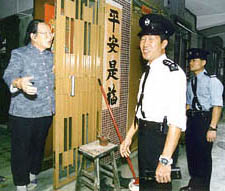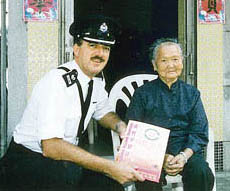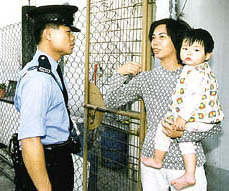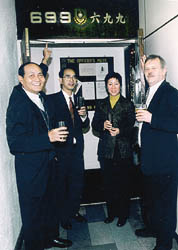



















 |
 |

|
| DVC Rod Colson hands out a Village Watch Scheme brochure pack to a Sheung Shui resident (centre); while CIP Li Kwok-ki has a friendly chat with another elderly villager; and a Sheung Shui woman shares information with a police constable while her baby looks on | ||
|
Tai Po Police District in conjunction with the North District Fight Crime Committee and the
North District Office recently held a Village Watch Scheme opening ceremony at Sheung
Shui Tai Tau Leng Tsuen.
Officiating at the ceremony, District Commander Tai Po, To Ho Kee, said he was pleased at the keen response from local villagers and expected close liaison and contact to be maintained between them and the Neighbourhood Police Community Officers. "Through assistance from the North District Fight Crime Committee and the North District Office," said District Commander To, "Villagers in the district have become more crime conscious and more willing to come forward to assist in the fight against criminal activity." One year after the introduction of the Village Watch Scheme in North District, OFFBEAT accompanied Sheung Shui Division's DVC Rod Colson and some of his officers through the narrow streets of Sheung Shui Heung to see just how successful the campaign has been . . . "WHEN the Village Watch Scheme began in January 1997, three villages joined. Sheung Shui Heung (which consists of nine villages) joined next with Tim Tam Leng following. That's a total of 13 villages so far," says DVC Colson as he and his officers are greeted by villagers who stop to chat. Mr Colson, a firm believer in the benefits of the scheme, also enquires whether they have received the Village Watch Scheme brochure pack which contains local police and emergency phone numbers, crime report forms, a detailed booklet on the scheme, and illustrated crime prevention tips, especially on making one's residence burglar-proof. "The District Fight Crime Committee came up with a sticker resembling a mobile phone that can be affixed near a telephone on which is printed the numbers of all the police stations in the area," he says. "Since those were distributed instances of villagers reporting crimes ¡Ð especially burglaries ¡Ð has gone up dramatically. The villagers are also calling and telling us they're seeing Illegal Immigrants. We're working very closely with the Quick Response Force and getting a lot of arrests as a consequence."Ó The campaign also involves placing "Village Watch Scheme" signboards to identify participating villages at their various entrances. Once the signs are up residents tend to keep more of a watchful eye on the area and become more aware of crime matters. This enhanced co-operation also enables police to better deploy resources when problems occur in a village. As part of the scheme, each village elects a representative to maintain close liaison and contact with the local Neighbourhood Police Community Officer who exchange crime information and crime prevention advice on a regular basis. Said Sheung Shui Division Chief Inspector Li Kwok-ki: "The local Neighbourhood Police Community Officers also assist residents in marking and recording details of valuable property to deter theft, and keep close contact with village representatives and meet the villagers at least once per month. Crime Prevention talks are delivered during these meetings. A feed back system is maintained with items of interest submitted to the DVC who then consolidates it into a quarterly report. Sheung Shui Heung's village representative is Kan Shek-lun. Indeed, the majority of Sheung Shui Heung residents are surnamed Kan. An avid golfer, Mr Kan is very enthusiastic about the Village Watch Scheme because he too sees the benefits in terms of a reduction in crime and increased security as a result of close co-operation between police and villagers. "Things are changing rapidly in our area," he said. "Where there once was an agricultural community, now stand developed, densely-packed three-storey houses. We are situated close to the boundary with the mainland and often people come here illegally. They have no jobs, so to survive they turn to crime. By working closely with the police we can help prevent our village from becoming a target. Since we're joined the scheme the villagers are getting to know the police quite well. That is a positive development.Ó Says DVC Colson: "Our objective is to improve communications between the villagers and police. We're working with our District Fight Crime Committee and the villagers in an effort to get the residents to change some of their old established traditions. In the past they tended to keep everything inside the village, and as a result crime didn't get reported. They tried to 'fix' things themselves. With the sheme we're trying to break that down. And it's beginning to work. | ||
|
| |
|
ON Friday 26 February 1999, a part of Hong
Kong Police history will come to an end. That's the day the 699 lounge on the 20th floor of
May House closes down forever as the building undergoes redevelopment as part of plans
for an overall redevelopment of Police Headquarters on Arsenal Street. It will be the last
chance for members, past and present, to raise their glasses and toast a venerable old room
that in its 26-year history has found a place in the hearts of many Hong Kong Police officers.
A.k.a. Rumour Control and The Other Office, 699 took its name from the extension number of the original lounge telephone. Says May House Police Officers' Mess Committee secretary CIP Ted Aitken-Davies: "The big closing down party will be on Friday 26 February, starting at 12:30pm. It'll be the lounge's last major function and we're looking for members, both present and past to drop in for the farewell celebrations. Bruce Ferguson, who retired as SSP IB, has left $500 to go towards a final round."Ó |
 A toast to 699: "CIP Peter Ip, Timothy Lam, SP Shirley Chu and CIP Ted Aitken-Davies" |
|
He continues: "We're expecting a lot of colleagues and friends to drop by for the farewell. The bar is not only known to most of our officers, but also to law enforcement people from overseas who visited the Hong Kong Police for one reason or another and came up here for a bite to eat and a social drink after the work day. Civilians, lawyers and others who have police friends or who deal with the police also drop by for a drink from time to time. And when ex-HKP officers living abroad come back to visit Hong Kong they still drop in to have a chat with Timothy Lam, who has been the barman since 1982.Ó Asked to recount some tales of the room from his 16-year perspective behind the bar, Timothy Lam On-hoo, now the manager and contractor of the Mess, just shrugs: "You mean 'publishable' stories?" "He's sworn to silence," smiles May House Police Officers Mess Committee chairwoman, WSP Shirley Chu. "What I recall are the many memorable retirement parties. But mainly my memories just centre around the lounge as a place were officers could come to unwind, let off a little steam and talk shop ¡Ð but also socialise. On Saturdays officers tend to bring their families. Says Chief Inspector Peter Ip Pau-fuk, a Committee house member and 699 stalwart: "Some of our most steadfast members have been very senior officers - mainly because the bar in the Senior Officers Mess in Caine House closes very early, but also because of the atmosphere. This place is very comfortable and unpretentious. "In this bar we have made a lot of friends and solved a lot of problems. I remember, in 1985 there was a double homicide in Braemar Hill which we were having difficulty solving. Then, one night we were here at about 9pm discussing the case ¡Ð out of which came the idea to extend the radius of our door-to-door inquiries by mobilising young PIs from PTS and the Detective Training School as extra manpower. Subsequently we found the murderer.Ó Continues Mr Ip: "Speaking as a local officer, I find the mess to be very necessary ¡Ð and useful. It's a place to come after work, unwind and talk with colleagues over a drink. You can also be more frank with your boss because people just speak more freely ¡Ð which is very healthy." | |

